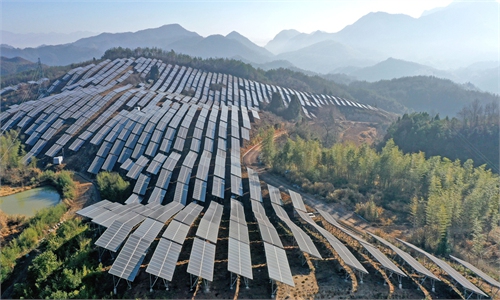
Illustration: Xia Qing/Global Times
At a time when the world is grappling with an ongoing energy crisis, as the result of the West's sweeping sanctions against Russia, some Westerners have constantly sought to find fault by questioning China's coal-fired power plan and the country's ability to achieve its climate goals. The latest example is a Bloomberg report on Monday claiming that China massively accelerated its coal power plan in 2022, approving "new capacity equivalent to all the UK's plants combined."The Bloomberg report, citing statistics from the Centre for Research on Energy and Clean Air based in Helsinki, Finland and the Global Energy Monitor based in California, US, claimed China's local governments permitted a combined 106 gigawatts of new plants, the most since 2015. "Beijing's willingness to keep investing in coal, in seeming contravention of its broader climate goals, shows an excess of caution when it comes to ensuring energy security," the report said.
It is unclear whether the figure of 106 gigawatts is accurate or not, but one thing is almost certain: the West keeps a close eye on China's coal power planning, and there is always some in the Westerner media hyping China's "coal threat," claiming that China's coal power plan could have very negative implications for tackling climate change.
There is no need to deny that China increased its coal capacity in 2022. According to a State Council meeting held in April 2022, China plans to increase its coal capacity by about 300 million tons in 2022.
However, one cannot interpret the plan of increasing coal capacity as a signal that the Chinese government will encourage or expand the coal consumption, nor maliciously misinterpret China's efforts to reduce carbon emissions and build a green economy.
For the energy industry, 2022 would be remembered as the year when the West's sweeping sanctions against Russia accelerated a global energy crisis. A global squeeze on energy supplies that has triggered crippling shortages and sent power and fuel prices surging is a constant reminder of the urgency of greater energy security. Against this backdrop, it's understandable and also necessary to place more focus on safeguarding energy security in China.
Coal is widely used in China for generating electricity. In 2021, although the share of coal use in China's energy mix has declined, it is still as high as 56 percent. Amid a global energy crisis, it comes as no surprise that China is working to improve the review and approval mechanisms for coal production and project construction. To cope with rapidly evolving external risks, the country has to increase coal capacity and safeguard energy security. However, it should be pointed out that a surge in new plant approvals can help increase production capacity, offering the nation more economic resilience and flexibility, but it doesn't necessarily mean its production capacity will be put to use and directly result in a surge in actual output. It should be noted that there is a difference between production capacity and actual output.
While China strives to improve its ability to stave off external risks and safeguard energy security, the country is also committed to promoting green energy transformation and tackling climate changes. In 2022, China issued its 14th Five-Year Plan (2021-25) for a modern energy system, in which it said that China will aim to ensure its grids source about 33 percent of power from renewable sources by 2025, up from 28.8 percent in 2020, according to media reports. This added to the evidence that a surge in new plant approvals can help increase coal capacity but will not affect China's pledge in cutting carbon emissions.
Renewable energy has played an increasingly prominent role in ensuring China's energy supply. According to data from the National Energy Administration (NEA), China's renewable energy power generation reached 2.7 trillion kilowatt-hours in 2022, accounting for 31.6 percent of the country's total electricity consumption, an increase of 1.7 percentage points compared with 2021, the Xinhua News Agency reported. Although some Westerners are keen on hyping "China coal threat," the share of renewable energy in China's total power generation has been steadily rising, and this is the best proof to debunk the West's anti-China lies.
The "China coal threat" is cooked up on the basis of false premises and judgments. In contrast to the US government's retreating commitment to tackle climate change, China has the political courage, economic incentive, technological capability and moral consensus to promote a true green energy transformation. Despite a new round of "China coal threat" attacks, China should follow its own pace and rhythm in developing coal capacity and building a green economy.
The author is a reporter with the Global Times. bizopinion@globaltimes.com.cn



